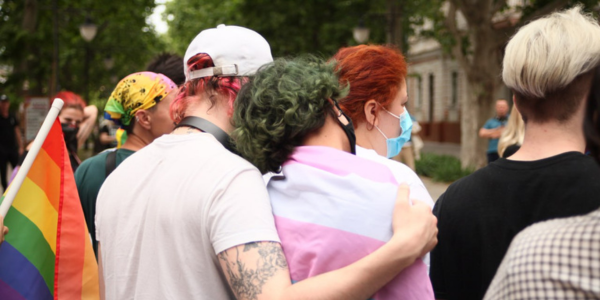by Olga Plakhotnik and Maria Mayerchyk
Queer Festival in Kherson (Ukraine), 2021. Photo credit: Stanislav Ostrous. Published with permission from the author.
Why are some feminists transphobic? How did it happen that a considerable part of feminist communities aligns with the conservative anti-gender movements in producing anti-transgender public discourse? Sadly, we cannot share Judith Butler’s opinion that transphobic feminists are a minority. When researching feminisms in Ukraine, we see that overt or covert (methodological) transphobia is pertinent to a significant part of academic and activist feminist discourse. Academics often rely on the epistemology of stable dichotomous biological sex, producing obscure but no less harmful transphobia. In activism, though, the biggest and steadily growing Ukrainian online community, Feminism UA, openly indicates in their ground rules that it is forbidden to support trans* activism and use corresponding vocabulary (like cis- or TERF) because ‘this is a misogynist practice’. We are not providing more examples to avoid further proliferation of transphobic hate speech, but they are available online for anyone curious. In this blog, we use the acronym TERF (trans-exclusive radical feminism) or terfism (as Alyosxa Tudor named it) to designate feminist transphobia.
One might assume this transphobic turn in Ukrainian activism and academia is a part of the recent wave of global transphobic discourse that infamously exploded in a JKR debate. Indeed, nowadays, Feminism UA regularly republishes transphobic materials from the British media. However, explicit transphobia in their narratives emerged much earlier, at least a decade ago.
Other feminist communities in Ukraine seek to oppose transphobia. For example, the ‘Gender in Detail‘ media platform positions itself as a trans-inclusive feminist venue and regularly publishes materials written by and in support of transgender people. Having the stable financial support of Western donors, Gender in Detail is influential and well-known media. In 2020, a noteworthy discussion took place on the platform after the editor asked their subsidiary Facebook community the following question:
Given the numerous discussions and publications in our media on transgender issues, did your attitudes toward transgender women change? More specifically, if you previously had a phobia of being attacked in a public toilet, did this phobia disappear after you read our materials? Why?
(Our comment: When translating this excerpt, we took the liberty to cut off the example of transphobic hate speech).
It can be assumed that the editor intended to get tangible proof of the media’s efficiency: that their publications actually work to reduce transphobic attitudes. However, many commentators admitted that their transphobic anxieties grew after reading the platform’s materials and following discussions in the trans-inclusive media and community. Why do even deliberate efforts to overcome transphobia in feminist settings fail while terfism continues blooming unhindered? Where, then, does feminist transphobia gain its power from?
Sure, there is more than one answer, given the scale and complexity of the problem. We, however, are keen to consider one factor that seems particularly important but not often addressed in the context of feminist transphobia: that of the the militarisation and securitisation of society. In this blog, we seek to unravel the not-so-obvious connections between the core ideas of militarisation as a worldview, the feminist concern about women’s safety and the standpoint that presents transgender people as potential perpetrators of sexualised violence.
Feminist scholar Cynthia Enloe has been studying the militarisation of people and everyday life for several decades now. Enloe understands militarisation as a complex process of formation and naturalisation of the specific worldview that privileges military-related solutions, people and institutions above others. According to Enloe, militarisation is not happening at once; it takes time to teach people this way of thinking and accept this way of reasoning. Subsequently, militaristic ideas become common sense and seep into the routine and the ordinariness of everyday life in material, affective, symbolic and discursive ways. Securitisation is a closely related process when some social issues are turned into an object of supreme protection, which is conducted through increased surveillance and security measures (or demands for these measures). As a result, militarised bodies and practices have become privileged over the vulnerable groups seeking protection. In this way, demands of securitisation entail militarisation (in Enloe’s interpretation), and they also presume projecting enemies. Sometimes LGBT people are constructed as enemies of the nation. In other cases, like TERF discourses, transgender people are constructed as enemies of women. Because both securitisation and militarisation unfold along the same logic of enemy/threat and security/guard, they go hand in hand and are often considered a kindred process: militarisation/securitisation (for example, here and here).
Enloe explains militarisation as a step-by-step process of unfolding and naturalisation of the ‘militarism package‘ – a set of assumptions people must learn. The first idea residing close to the very core of the militarism package is that ‘the world is a dangerous place’. For the militarised perspective to thrive, people must believe that the world is dangerous, enemies are everywhere, and that violence or using force is the only logical response to such an omnipresent danger. In fact, there could be less militarised assumptions about what the world is: a creative place, a humane place, a cooperative place, but these ideas are typically dismissed by the militarised logic as ‘unrealistic’ and ultimately naïve.
Drawing on this theorising of militarisation, we can see how the idea of the world as a dangerous place underpins the well-known feminist concept of ‘rape culture’. This concept is instrumental in grappling with sexual harassment and other forms of sexualised violence in the modern world. The idea of ‘rape culture’ gained currency during the past decades and informed a significant part of feminist praxis in Ukraine, including the local ‘Me Too’ movement under the slogan ‘I am not afraid to say’ (Я не боюся сказати – Ukrainian). The central concern of this segment of feminist activism is women’s right to safety through bodily autonomy and informed consent.
While supporting this struggle and participating in it in many ways, we cannot help but see how the feminist framework of ‘rape culture’ proliferates the imaginary of the world as a dangerous place and becomes a tool of trans-exclusive feminists to frame the figure of a transgender woman as the primary threat, a rapist. It is remarkable how a major part of transphobic discourse obsessively put together rape and toilets. It is well known that people can be raped anywhere, quite often in presumably ‘safe’ places. And yet we can see how a ‘bathroom problem’, famously analysed by Jack Halberstam, appears at the centre of the transphobic hatred, now justified by the feminist idea of ‘rape culture’. Even a well-intended survey of the trans-inclusive ‘Gender in Detail’ media reiterates this central argument of the TERF discourse – the phantasm of a transgender woman lurking in a sex-segregated public toilet. When the militarised interpretation of sexualised violence and cis-gender anxiety collide, they fuel feminist transphobia.
Does it mean that the concept of ‘rape culture’ is transphobic? Not by itself. For feminist transphobia to evolve, the idea of ‘rape culture’ has to be firmly positioned within the framework of sexual essentialism – which, by the way, some theorists (for example, Maria Lugones) render as colonial. The episteme of dichotomous gender not only underpins the dominant cis-normative heterosexist regime but also belongs to the core of the ‘militarism package.’ According to Enloe, every nation-specific case of militarisation is gendered in a particular way. It can be grounded in a firmer or softer polarisation of the ‘female’ and ‘male’ social functions; it can sometimes allow or even invite women and transgender people to serve in the military but only in the way of cementing the essentialist idea of binary gender. Hence, it can be concluded that feminist transphobia occurs when the critical concept of ‘rape culture’ reaches its limits within the militarised essentialist system of the gender binary.
But if militarisation/securitisation and transphobia are connected, as we propose in this blog piece, how does the actual war – for example, the war started by Russia in Ukraine in 2014 and unfolded into full-scale military aggression in 2022 – affect this issue? How does the critical feminist perspective on militarisation work when we seek to account for the difference between imperialist militarist politics and the forced necessity of self-defence? We rely, for a start, upon Enloe’s suggestion to distinguish between militarisation and militarism. The latter is unavoidable today when Ukraine fights the bloodshed attacks of imperialist Russia. While some Ukrainian feminist initiatives believe that the ongoing war is a chance for gender equality and women’s empowerment (because of women’s participation in the military), we do not share such optimism. We believe it is vital to keep the process of militarisation of all aspects of life in a critical focus, even in a time of a full-scale imperialist invasion. Because, as feminists from Caucasus and Balkans teach us, war brings neither empowerment nor justice.
 Dr Olga Plakhotnik received PhD from the Open University and currently works at the University of Greifswald as a PI of the team project ‘Un)Disciplined: Pluralizing Ukrainian Studies—Understanding the War in Ukraine”. Considering themselves scholar-activist and educator, they works in the area of feminist/queer epistemologies, critical citizenship studies, and feminist/ queer pedagogies. Olga’s PhD project at the Open University (2019) explored imaginaries of sexual citizenship in post-Maidan Ukraine.
Dr Olga Plakhotnik received PhD from the Open University and currently works at the University of Greifswald as a PI of the team project ‘Un)Disciplined: Pluralizing Ukrainian Studies—Understanding the War in Ukraine”. Considering themselves scholar-activist and educator, they works in the area of feminist/queer epistemologies, critical citizenship studies, and feminist/ queer pedagogies. Olga’s PhD project at the Open University (2019) explored imaginaries of sexual citizenship in post-Maidan Ukraine.
 Dr Maria Mayerchyk is an Alexander von Humboldt Fellow at the University of Greifswald, Germany. She holds a Candidate of Sciences degree in History specializing in Ethnology. Dr Mayerchyk teaches courses on queer, gender, feminisms, folklore, and Ukrainian culture in Germany, Canada, and Ukraine. She held an academic position at the University of Alberta (Canada) and was visiting researcher at Harvard University (USA), Lund University (Sweden), and the University of South Florida (USA). Her research interests include queer and feminist epistemologies, decolonial option, East European studies, diaspora studies, and critical folklore studies.
Dr Maria Mayerchyk is an Alexander von Humboldt Fellow at the University of Greifswald, Germany. She holds a Candidate of Sciences degree in History specializing in Ethnology. Dr Mayerchyk teaches courses on queer, gender, feminisms, folklore, and Ukrainian culture in Germany, Canada, and Ukraine. She held an academic position at the University of Alberta (Canada) and was visiting researcher at Harvard University (USA), Lund University (Sweden), and the University of South Florida (USA). Her research interests include queer and feminist epistemologies, decolonial option, East European studies, diaspora studies, and critical folklore studies.
Olga Plakhotnik and Maria Mayerchyk are editors-in-chief of the refereed journal Feminist Critique: East European Journal of Feminist and Queer Studies.


